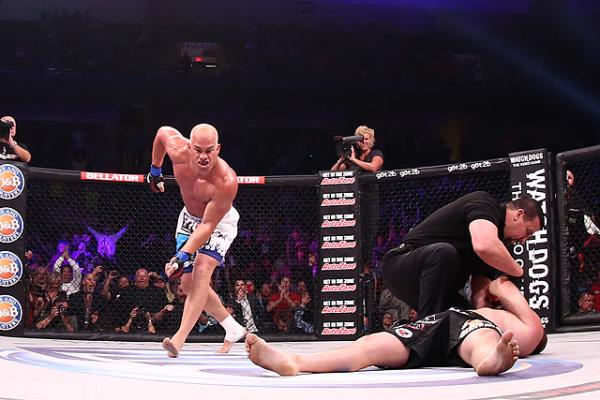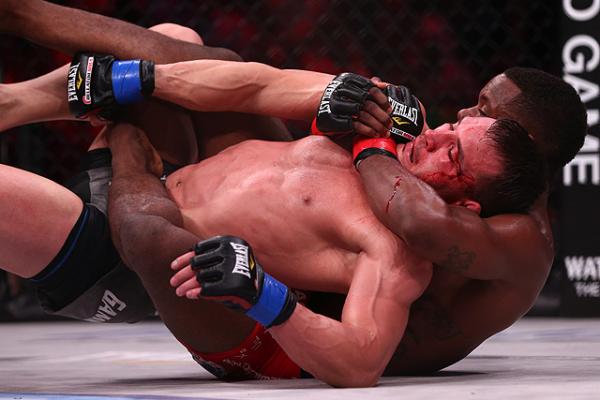Viewpoint: Money Talks

Tito
Ortiz stole the show at Bellator’s first pay-per-view. | Photo:
Dave Mandel/Sherdog.com
Bellator MMA held its inaugural pay-per-view on Saturday at the Landers Center in Southaven, Miss., and I think the company had its breakthrough moment. The problem: I am not sure exactly what it means, and neither do the suits at parent company Viacom.
As a television property, Bellator makes money for Spike TV because it has a tight budget for each show. The advertising revenue is worth the investment because of the demographics Bellator shows attract. However, there is a ceiling on how much Bellator can make as a cable TV property. Pay-per-view is where the money is at. In order for Bellator employees to get those in charge at Viacom to open up the checkbook to finance bigger shows, they have to demonstrate an ability to make waves on PPV. The buy rate numbers are key, but social media buzz also is important. If Bellator can establish an emotional connection with some MMA fans, then Spike TV has something it can work with long-term.
Advertisement
Bellator 120 created a lot of strange, exhilarating and befuddling moments. It gave me flashbacks to the days of EliteXC events five years ago. There is still a segment of the population that fondly remembers Kevin Ferguson, aka “Kimbo Slice,” and promoter Gary Shaw’s musically challenged son. However, if there is one positive thing EliteXC accomplished in MMA, it is the fact that the company made stars and marketed fighters as individual personalities. There is a reason the UFC is still interested in booking Gina Carano. EliteXC made an impact on CBS and Showtime. It also lost more than $50 million dollars. Promoting MMA is a fast way to lose money while having a good time, but as long as Viacom owns Bellator, it is not going to lose $50 million dollars.
The UFC has oversaturated the marketplace with an overabundance of
events. There have been some great fights recently, including
Robbie
Lawler-Johny
Hendricks and Matt
Brown-Erick Silva.
However, when you promote so many fights, previous epic encounters
more or less become a blur. You always have to catch up with the
next show to watch. For many fans, watching MMA has become a chore,
like homework. What MMA needs right now are more choices and
different approaches, not a one-size-fits-all weekly calendar of
product that looks and feels the same.
This is where Bellator can develop a niche for itself: quirky, goofy, bizarrely entertaining, mind-blowing and occasionally illogical. Give the fans a product that can draw a wide range of emotions, and you have something that can be marketed.
At Bellator 120, Muhammed “King Mo” Lawal trashed Bellator CEO Bjorn Rebney after getting screwed on the Mississippi scorecards, and UFC hall of famer Tito Ortiz saved his career by submitting Alexander Shlemenko with an arm-triangle choke. When I recently wrote about Ortiz being viewed as a punchline by fans and industry insiders, I was actually defending the guy from what I think has been unfair criticism about his track record as a fighter. He has fought some incredibly tough guys and, win or lose, he has been willing to put himself in humiliating positions. He has not been afraid to succeed or fail miserably. His match with Shlemenko was a perfect demonstration of this principle at work. Ortiz was booked against an opponent that was supposed to exploit his vulnerability to vicious body shots. Rebney came out before the fight and admitted he thought Ortiz would back out at the last minute. Instead, Ortiz not only stole the show but proceeded to steal the post-fight press conference stage by stating he was put on Earth to be a tool. You cannot make up this stuff.

Photo: D.
Mandel/Sherdog.com
Chandler learned a hard lesson.
You can argue -- and many critics did -- that two of Bellator’s young stars had their reputations damaged at the PPV and that the overall pacing of the event was terrible. The event went past the three-hour time window; and the tournament format, which was long a marketing staple for Bellator, is on shaky ground. The good news for Bellator is that it now has stars to promote.
Quinton “Rampage” Jackson can fight Emanuel Newton for the light heavyweight title, embrace a rematch with “King Mo” or face his original PPV opponent -- Ortiz. We are still likely going to see Alvarez-Chandler 3, but Brooks is now a player at 155 pounds. Interim bantamweight champion Joe Warren remains a marketable character. There are marketing options now available for future Bellator PPV events. That is a critical factor in convincing Viacom to invest more money into future Bellator shows. If you are a fight fan, you want and need to see competition in this sport.
Getting on PPV and making money in that arena is an important business step for Bellator. After the WWE Network was launched, a lot of writers cheered on this development as one more step in killing the concept of pay-per-view. PPV is a dying industry, they said. PPV is not where the money is going to be, they claimed. PPV is killing fan interest, they wrote. Those thoughts simply are not true. PPV is as strong as ever; you just need a compelling product to market. Floyd Mayweather Jr. moves the needle in boxing, as does Manny Pacquiao. UFC women’s bantamweight champion Ronda Rousey is compelling and has potential to raise her ceiling as a marketing draw. Stars sell. Bellator now has some stars with which to work for PPV marketing. There is potential for growth or least a perception that there is potential.
If Bellator can succeed on PPV, it will open new steams of revenue for the company. That is a far more optimistic position to be in right now than having Wall Street investors breathing down World Wrestling Entertainment’s neck because it missed projections on how many subscribers it would get for its digital online network. PPV is a known commodity. The WWE’s departure from PPV opens up opportunities for Bellator to cash in. The WWE may ultimately succeed with its network but it is a risky gamble, and it may have to go back to PPV eventually. If you are an investor, you want to spend money on what you know, not what you do not know.
The question for Viacom is figuring out what exactly it has with Bellator and how to invest in the company’s future.
Related Articles





